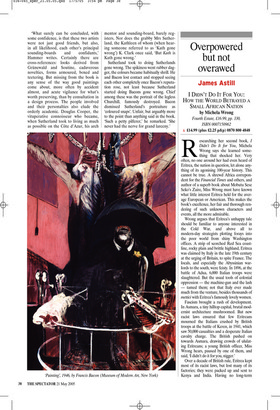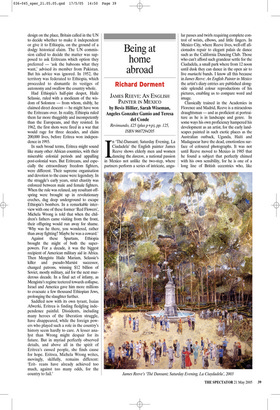Overpowered but not overawed
James Astill
I DIDN’T DO IT FOR YOU: HOW THE WORLD BETRAYED A SMALL AFRICAN NATION by Michela Wrong Fourth Estate, £16.99, pp. 330, ISBN 0007150962 & £14.99 (plus £2.25 p&p) 0870 800 4848 Researching her second book, I Didn’t Do It for You, Michela Wrong says she learned something that shocked her. Very often, no one around her had even heard of Eritrea, the nation in question, let alone anything of its agonising 100-year history. This cannot be true. A shrewd Africa correpondent for the Financial Times and others, and author of a superb book about Mobutu Sese Seko’s Zaire, Miss Wrong must have known what little interest Eritrea held for the average European or American. This makes the book’s excellence, her fair and thorough rendering of such unknown characters and events, all the more admirable.
Wrong argues that Eritrea’s unhappy tale should be familiar to anyone interested in the Cold War, and above all to modern-day strategists plotting forays into the poor world from shiny Washington offices. A strip of scorched Red Sea coastline, rocky plain and brittle highland, Eritrea was claimed by Italy in the late 19th century at the urging of Britain, to spite France. The locals, and especially the Abyssinian warlords to the south, were feisty. In 1896, at the battle of Adua, 6,000 Italian troops were slaughtered. But the usual tools of colonial oppression — the machine-gun and the lash — tamed them; not that Italy ever made much from the venture, besides thousands of mettici with Eritrea’s famously lovely women.
Fascism brought a rush of development. In Asmara, a tiny hilltop capital, brutal modernist architecture mushroomed. But new racist laws ensured that few Eritreans mourned the Italians crushed by British troops at the battle of Keren, in 1941, which saw 50,000 casualties and a desperate Italian cavalry charge. The British pushed on towards Asmara, drawing crowds of ululating Eritreans; a young British officer, Miss Wrong hears, paused by one of them, and said, ‘I didn’t do it for you, nigger.’ Over a decade of British rule, Eritrea kept most of its racist laws, but lost many of its factories; they were packed up and sent to Kenya and India. Having no long-term design on the place, Britain called in the UN to decide whether to make it independent or give it to Ethiopia, on the ground of a dodgy historical claim. The UN commission called to decide the matter was supposed to ask Eritreans which option they preferred — ‘ask the baboons what they want,’ advised its member from Pakistan. But his advice was ignored. In 1952, the territory was federated to Ethiopia, which proceeded to dismantle its vestiges of autonomy and swallow the country whole.
Had Ethiopia’s half-pint despot, Haile Selassie, ruled with a modicum of the wisdom of Solomon — from whom, risibly, he claimed direct descent — he might have won the Eritreans over. In reality, Ethiopia ruled them far more thuggishly and incompetently than the Europeans, and they resisted. In 1962, the first shots were fired in a war that would rage for three decades, and claim 200,000 lives, before Eritrea won independence in 1993.
In such broad terms, Eritrea might sound like many other African countries, with their miserable colonial periods and appalling post-colonial wars. But Eritreans, and especially the extraordinary freedom fighters, were different. Their supreme organisation and devotion to the cause were legendary. In the struggle’s early years, strict chastity was enforced between male and female fighters. When the rule was relaxed, any resultant offspring were brought up in revolutionary creches, dug deep underground to escape Ethiopia’s bombers. In a remarkable interview with one of these former ‘Red Flowers’, Michela Wrong is told that when the children’s fathers came visiting from the front, their offspring would run away for shame. ‘Why was he there, you wondered, rather than away fighting? Maybe he was a coward.’ Against these Spartans, Ethiopia brought the might of both the superpowers. For a decade, it was the biggest recipient of American military aid in Africa. Then Mengistu Haile Mariam, Selassie’s killer and pseudo-Marxist successor, changed patrons, winning $12 billion of Soviet, mostly military, aid for the next murderous decade. In a final act of infamy, as Mengistu’s regime teetered towards collapse, Israel and America gave him more millions to evacuate a few thousand Ethiopian Jews, prolonging the slaughter further.
Saddled now with its own tyrant, Isaias Afwerki, Eritrea is finding fledgling independence painful. Dissidents, including many heroes of the liberation struggle, have disappeared, while the foreign powers who played such a role in the country’s history seem hardly to care. A lesser analyst than Wrong might despair for its future. But in myriad perfectly observed details, and above all in the spirit of Eritrea’s cussed people, she finds cause for hope. Eritrea, Michela Wrong writes, movingly, skilfully, remains different: ‘Eritreans have already achieved too much, against too many odds, for the country to fail.’


























































 Previous page
Previous page